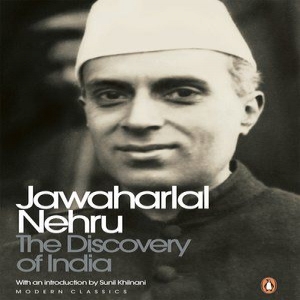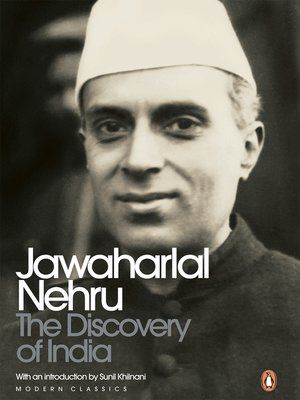

Pandit Jawaharlal Nehru briefly discusses the Vedas and the Upanishads in The Discovery of India. In the face of growing religiosity and the rise of Hindu fundamentalism in today's India, it is essential to understand his liberal interpretation of these ancient holy texts. His narrative is fascinating. The excerpts from the book are reproduced:
The Vedas
Hindus look upon the Vedas as scripture. This seems peculiarly unfortunate, for we miss their real significance – the unfolding of the human mind in the earliest stages of thought. And what a wonderful mind it was! The Vedas were simply meant to be a collection of existing knowledge; they are a jumble of many things: hymns, prayers, rituals for sacrifice, magic, and magnificent nature poetry. There is no dilatory in them, no temples for the gods. The early Vedic Aryans were so full of the zest for life…they believed in some kind of existence after death. Gradually, the conception of God grows. These developments take place over the course of hundreds of years, and by the time we reach the end of the Vedas, the Vedanta (anta, meaning end), we have the philosophy of the Upanishads.
The Rig Veda, the first of the Vedas, is the earliest book that humanity possesses. In it, we can find the first outpourings of the human mind, the glow of poetry, the rapture at nature's loveliness and mystery. And in these early hymns, there are, as Dr MacNicol says, the beginning of "the brave adventures made so long ago and recorded here, of those who seek to discover the significance of our world and of man's life within it…India here set out on a quest which she has never ceased to follow. "Yet behind the Rig Veda itself lay ages of civilised existence and thought, during which the Indus Valley and the Mesopotamian and other civilisations had grown.
These Vedic hymns have been described by Rabindranath Tagore as "a poetic testament of a people's collective reaction to the wonder and awe of existence. A people of vigorous and unsophisticated imagination awakened at the very dawn of civilisation to a sense of the inexhaustible mystery that is implicit in life. It was a simple faith of theirs that attributed divinity to every element and force of nature, but it was a brave and joyous one, in which the sense of mystery only gave enchantment to life, without weighing it down with bafflement – the faith of a race unburdened with intellectual brooding on the conflicting diversity of the objective universe, though now and again illumined by intuitive experience as: Truth is one: though the wise call it by various names."
The Upanishads
The Upanishads, dating from 800 BC, take us a step further in the development of Indo-Aryan thought. The Vedic gods no longer satisfy people, and the rituals and the priests are made fun of. But there is no attempt to break with the past; the past is a starting point for further progress. The Upanishads are instinctive, with a spirit of inquiry, mental adventure, and a passion for discovering the truth. The search for this truth is, of course, not by the objective methods of modern science, yet there is an element of the scientific method in the approach. No dogma is allowed to come in the way. The emphasis is essentially on self-realisation.
The general tendency is towards monism, and the whole approach is evidently intended to lessen the differences that must have existed then, leading to fierce debate. It is the way of synthesis. The duties and obligations imposed by life were to be carried out but in a spirit of detachment. "There is nothing higher than the person," say the Upanishads. This old Indian approach was not a narrow nationalistic one, though there must have been a feeling that India was the hub of the world, just as China, Greece and Rome have felt at various times. "The whole world of mortals is an interdependent organism," says the Mahabharata.
The metaphysical aspect of the questions considered in the Upanishads is difficult to grasp… this approach to a problem has so often been shrouded by dogma and blind belief. It was the philosophical approach and not the religious one… the vigour of the thought, the questioning, the rationalistic background. The form is terse, often involving question-and-answer between the pupil and teacher. Professor FW Thomas, in The Legacy of India, says: "What gives to the Upanishads their unique quality and unfailing human appeal is an earnest sincerity of tone, as of friends conferring upon matters of deep concern." Rajagopalachari eloquently speaks of them: "The spacious imagination, the majestic sweep of thought, and the almost reckless spirit of exploration with which, urged by the compelling thirst for truth, the Upanishads teachers and pupils dig into the 'open secret' of the universe, make this most ancient of the world's holy books still the most modern and most satisfying."
The dominating characteristic of the Upanishads is the dependence on truth. "Truth wins ever, not falsehood. With truth is paved the road to the Divine. "And the famous invocation is for light and understanding: "Lead me from the unreal to the real! Lead me from darkness to light! Lead me from death to immortality." Again and again, the restless mind peeps out, ever seeking and ever questioning: "At whose behest doth mind light on its perch? At whose command doth life, the first, proceed? Why can't the wind remain still? Why has the human mind no rest?" It is the adventure of man that is continually calling, and there is no resting on the way and no end of the journey. There is no humility about all this quest, the humility before an all-powerful deity so often associated with religion. It is the triumph of mind. "My body will be reduced to ashes and my breath will join the restless and deathless air, but not I and my deeds. O mind, remember this always."
What is the soul? The individual soul is like a spark thrown out and reabsorbed by the blazing fire of the absolute soul... without form. This realisation that all things have that same essence removes the barriers which separate us from them and produces a sense of unity with humanity and nature. This unity underlies the diversity and manifoldness of the external world.
It is interesting to compare and contrast the intense individualism and exclusiveness of the Indo-Aryans with this all-embracing approach, which overrides all barriers of caste and class and every other external and internal difference. This is a kind of metaphysical democracy. "He who sees the one spirit in all, and all in the one spirit, henceforth can look with contempt on no creature." Undoubtedly, it must have affected life and produced that atmosphere of tolerance and reasonableness, that acceptance of free thought in matters of faith, and that desire and capacity to live and let live, which are dominant features of Indian culture. There was no totalitarianism in religion or culture, and they indicate an old and wise civilisation with inexhaustible mental reserves.
There is a question in the Upanishads to which a very curious and yet significant answer is given. The question is: "What is this universe? From what does it arise? Into what does it go?" And the answer is: "In freedom it rises, in freedom it rests, and into freedom it melts away." The authors of the Upanishad were passionately attached to the idea of freedom and wanted to see everything in terms of it. Swami Vivekananda was always emphasising this aspect. The message of the Upanishads has found willing and eager listeners throughout Indian history and has powerfully moulded the national mind and character. There is no important form of Hindu thought, heterodox Buddhism included, which is not rooted in the Upanishads.
Early Indian thought penetrated Greece through Iran and influenced some thinkers and philosophers there. Plotinus came to the East to study Iranian and Indian philosophy and was significantly influenced by the mystic element in the Upanishads. From Plotinus, many of these ideas are said to have gone to St Augustine and, through him, influenced the Christianity of the day. The rediscovery of Indian philosophy by Europe during the past century and a half created a powerful impression on European philosophers and thinkers. Schopenhauer is often quoted in this connection: "From every sentence of the Upanishads deep, original and sublime thoughts arise, and the whole is pervaded by a high and holy and earnest spirit. In the whole world there is no study so beneficial and so elevating as that of the Upanishads. They are products of the highest wisdom. The study of the Upanishads has been the solace of my life; it will be solace of my death."
Max Muller says: "Schopenhauer was the last man to write at random or to allow himself to go into ecstasies over so-called mystic and inarticulate thought. And I am neither afraid nor ashamed to say that I share his enthusiasms for the Vedanta, and feel indebted to it for much that has been helpful to me in my passage through life. The Upanishads are the sources of the Vedanta philosophy, a system in which human speculation seems to me to have reached its very acme. I spend my happiest hours in reading Vedantic books. They are to me like the light of the morning, like the pure air of the mountains – so simple, so true…"
The most eloquent tribute to the Upanishads and to the Bhagavad Gita was paid by Æ (GW Russell), the Irish poet: "Goethe, Wordsworth, Emerson and Thoreau among moderns have something of this vitality and wisdom, but we can find all they have said and much more in the grand sacred books of the East. The Bhagavad Gita and the Upanishads contain such godlike fullness of wisdom on all things that I feel the authors must have looked with calm remembrance back through a thousand passionate lives, full of feverish strife for and with shadows, ere they could have written with such certainty of things which the soul feels to be sure."
This is the ancient Indian philosophical thought and wisdom that had universal appeal.